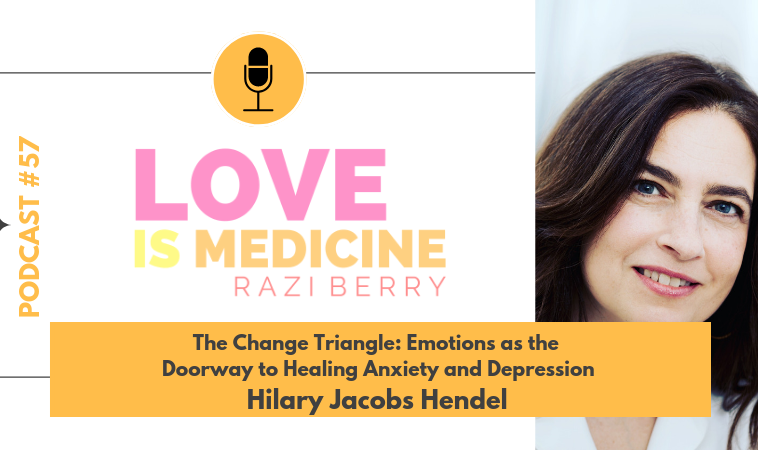Hilary Jacobs Hendelis a licensed social worker, author of the critically acclaimed and two-time award-winning book, It’s Not Always Depression, she is a certified psychoanalyst and AEDP psychotherapist and supervisor, has published articles in The New York Times, TIME, and Oprah, and also consulted on the psychological development of characters on AMC’s Mad Men.
Or, listen on your favorite app: iTunes (Apple Podcasts) | Spotify | Stitcher | TuneIn | Android
It is true that we really think with our whole bodies, which is why it is important to equip yourself with the skills and knowledge necessary to calm and regulate your nervous system, resist from acting on impulses and minimize your shame.
Hilary has created The Change Triangle framework to help others understand the shift between our core emotions and defense mechanisms and learn how to master an emotion for good. By understanding how The Change Triangle works to validate a feeling and figuring out how to channel that emotion into something helpful, you can get to the state of the open-hearted self.
Our body is wired with emotions from the get-go and it is only by tuning into the sensations within yourself that you can understand your impulses, embrace your core emotions and channel them through emotionally mature realms of possibility.
Are you ready to take control of your emotions and embrace the open-hearted self? Share what steps you are taking with us in the comments below.
In This Episode
- Understanding in a nutshell what it means to experience an emotion
- Self-help tools to be less frightened and overwhelmed by your emotions
- How to turn your attention into the body to notice a physical sensation
- Embracing the open-hearted self and ways to demystify your emotions
- Mindfulness practices to stop acting on your impulse and create space
Quotes
“What we now have is too much shame, that is constricting us too much and not allowing our true authentic selves, and our emotions to flow. And that’s where the problem happens.” (23:24)
“Part of the ways that I think we can all grow is to find our pockets of shame… to kind of know your vulnerability there and decide whether you want to work on it and kind of share it and talk about it so that it becomes less toxic and less constricting.” (24:46)
“If children were learning this and young adults, and we were sort of minimizing the trauma, minimizing anxiety, minimizing guilt and shame, we are all going to feel much calmer and confident and able to meet the challenges of life.” (33:24)
“With a little bit of education, we can reverse the trajectory of burying emotions, to living more authentically knowing what we are feeling and how to communicate that.” (46:52)
Links
It’s Not Always Depression by Hilary Jacobs Hendel
















